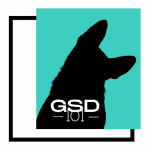As a first-time dog parent, it’s pretty normal to worry about what to feed your German Shepherd. Questions like what is the best dog food for your Shepherd or how do I choose the best food are just some of the many that must be crossing your mind right now.
When it buying dog food for your German Shepherd, look at the list of ingredients, unique formulas, feeding directions, nutrient composition, and AAFCO’s nutritional adequacy statement to determine whether or not the food is complete and balanced for the needs of your dog. Checking out reviews left by other users is also another great way to find the best dog food.
To help you narrow down your search, we go over the key things to look for when shopping for dog food for your German Shepherd. We will also share some of the best dog foods for German Shepherds. Let’s get started!~
Do German Shepherds need special dog food?
German Shepherds are active and athletic dogs. Because of this, they require a power-packed diet to help maintain their high energy level while staying healthy.
GSDs do not require special food unless they have a sensitive stomach or food allergies. If your dog has any of these, your vet can help you identify the triggers so that you can eliminate them from their diet.
That said, German puppies are more prone to hip dysplasia if fed food containing too much calcium. This is something you must be keen to remember.
Also read: Hip Dysplasia In German Shepherds: Everything An Owner Needs To Know
Nutritional requirements for German Shepherds
German Shepherds will need different nutritional requirements throughout their different life stages.
Puppies, for instance, have infinite energy in addition to rapid growth. This means they need to eat more.
GSD puppies need:
- 22% protein
- 5–8% fat
- And a good amount of calcium and phosphorus for strong bones and joints
Adult GSDs require:
- 18% Protein
- 5% Fat
- And high amount of natural fibers and Vitamin C in their diet to maintain their growth
Senior GSDs do not require a diet high in carbs and fat because they are not as active but they do require more proteins. They also need more fiber, vitamins and minerals, particularly Omega 3&6.
| Puppies | Adults | Seniors | |
| Nutritional Requirements | 22% protein 5-8% fat Calcium and phosphorus | 18% protein 5% fat Natural fibersVitamin C | 28% protein 5.5% fat Low sodium Low-calorie Low phosphorus High fiber Omega 3 & 6 fatty acids |
What to look for when buying German Shepherd dog food?
Like humans, nutrition can affect a dog’s health, mood, and behavior. Therefore, you must choose the best food for your dog if you want a high-functioning, happy, well-mannered dog. But you can only make the right choice if you know what to look for. Below are key things to look out for.
Age, size, and weight
Always be mindful of your dog’s age, size and weight when shopping for their food. An adult German Shepherd has totally different nutritional requirements from a puppy or senior GSD. This means their diets will vary greatly.
List of ingredients
Check the list of ingredients on the label. You specifically want to check that the ingredients indicated on the label are safe for dog consumption. Steer clear from foods that contain preservatives, artificial sweeteners, and flavors. Also, stay away from non-specified ingredients. If a label says meat meal it needs to specify the source of the meat. Similar to animal fat and bone meal.
Nutritional adequacy statement
AAFCO, the Association of American Feed Control Officials, is the body responsible for developing model pet food and even though AAFCO has no mandated authority on pet food regulation, it is worth checking for its nutritional adequacy statement.
This statement from AAFCO is an assurance for dog owners that the dog food is complete and balanced for their dog’s particular life stage.
Guaranteed analysis
You also want to check for the guaranteed analysis. This will show each ingredient’s minimum and maximum composition. You particularly want to check the composition of crude protein, crude fiber, and crude fat, as well as the minimum calcium and maximum ash contained in the food.
(Source: FDA)
Special Formula
If your dog has allergies or food sensitivity, you want to look for Hypoallergenic dog foods or foods with limited ingredients that do not contain the allergens that trigger the allergy. For instance, if your dog has skin allergies you may want to opt for a diet high in omega 3, and one, of course, one without the allergen.
Feeding guidelines
Another important thing to check in dog food is the feeding guidelines. The guideline should indicate how much weight of the food you should give to your German Shepherd and how many feeds in a day they should consume. The guideline is often provided in a table along with any other additional instructions.
Price
Just like with everything else, you get what you pay for when it comes to dog food. However, that doesn’t mean you pay an arm and a leg for a top brand, nor does it mean you go the cheap route. There are good quality foods within reasonable price points.
Users’ reviews
You also want to check what other users say about the food. Based on the users’ reviews, you can tell what to expect in terms of quality and how your dog may react to the food. Amazon has some of the most real user reviews, so you may want to start there.
Online resources
To make the best decision regarding what to feed your GSD, you will need to be very knowledgeable. Thankfully there are tons of resources online to help you figure out nearly everything. Dogfoodadvisors.com, thesprucepets.com, dogster.com, and the MSPCA website are among the most reliable resources out there.
Vet’s recommendation
Lastly, you want to check with your vet on what food is best for your pooch. Based on the dog’s history and health, your vet should advise you on what key ingredients to look out for and even point you to some of the best German Shepherd food.
What to avoid when buying GSD dog food?
Keep an eye on the packaging when shopping for your GSD’s food. You want to avoid any food that contains preservatives, artificial flavors, sweeteners, and fillers.
You also want to avoid any dog food with by-products. These are usually slaughterhouse wastes unfit for your dog.
Dr. Marty Goldstein, a 45-year veterinarian, refers to these foods as stomach disruptors. According to him, they could cause skin problems, poor digestion, irregular stools, and in some instances, depression.
Related: The Best & Worst Dog Foods Ever – According to a 45-Year Veterinarian
Top 5 dry dog foods for German Shepherds on Amazon.com
This is a specially formulated dog food for purebred German Shepherd puppies who are between 8 weeks to 15 months old. The food is made from high-quality proteins and includes antioxidants for the development of strong immunity. The food is highly digestible, so your dog shouldn’t have digestive issues or problems passing stool.
NUTRO NATURAL CHOICE is suitable for dogs older than 12 months. It is made from real chicken and brown rice, among other high-quality ingredients. The food supports dogs’ immunity as well as promotes healthy digestion. It can also be fed to overweight puppies to aid in healthy weight loss.
This is a grain-free dog food specially formulated for active dogs of all sizes with grain allergies or sensitivities. Dog food contains a high amount of proteins from fish, pork and beef for immune support. The food also supports the healthy development of joints, hips and the coat.
The Purina Pro Plan for sensitive skin and stomach contains salmon as the most dominant ingredient which provides omega-3 and 6 fatty acids for healthy joints and skin coat. It also contains oatmeal and prebiotics for good digestive health. Purina Pro Plan is ideal for adult German Shepherds.
Wilderness Salmon is only suitable for adult GSDs. While the bulk of its protein comes from fresh salmon and chicken meals, it also contains menhaden fish meal, peas, and pea protein. The food supports a healthy heart, coat, hip, and joint growth.
Top 5 wet dog food for German Shepherds
This Chicken & Rice Formula is perfect for homes with multiple dogs. It can be fed to puppies, adults, seniors, and even dogs with sensitive stomachs. The recipe contains chicken, brown rice, chicken liver, and chicken broth. It also contains probiotics and antioxidants for a healthy digestive system.
High protein BLUE Buffalo Wilderness is packed with real beef, chicken, fruits, and vegetables, as well as fortified with vitamins and minerals. It is a grain-free food made from the finest natural ingredients formulated for the well-being of adult dogs.
Purina Pro Plan Grain Free dog food is made with ingredients like real chicken and turkey. The high protein diet containing 23 essential vitamins supports a healthy immune system, maintains muscle mass and nourishes the dog’s skin and coat. This is a complete and balanced diet for adult dogs.
This is an all-natural and grain-free food for dogs with sensitive stomachs. It contains just a single protein, a high-quality lamb which gives the food a savory taste. This limited-ingredient meal can be served as a mixer or a topper.
Royal Canine is suitable for adult dogs of all ages. The chicken-flavored dog food contains a number of beneficial ingredients, all designed to support overall nutrition and digestive health. It also supports the good health of the dog’s skin and coat. Take note, however, that it contains chicken by-products and port by-products. Which we highly discourage.
Conclusion
Finding the right dog food for your German Shepherd can be overwhelming. You must look at a few things before making the purchase, such as ingredients, nutritional composition, appropriate age, size, and weight of the dog, feeding directions, and of course, the price. But this is the price you must pay to keep your dog in perfect health. Totally worth it, don’t you agree?
FAQs
What food should we not give to the German Shepherd?
You should not give a GSD any food that contains fillers, sweeteners, preservatives, flavors, and meat by-products. These ingredients are harmful to the dog’s health.
Should German Shepherds be on grain-free food?
German Shepherds should be fed grain-free food because they are more likely to develop allergies and stomach sensitivity when they consume grains.
When can I safely switch my German shepherd puppy to adult food?
You can switch from puppy to adult food from around 8 to 16 months. However, the switch must be gradual so as not to cause digestive disruption.
More posts on feeding your German Shepherds

Must read:
- The Best & Worst Dog Foods Ever – According to a 45-Year Veterinarian
- Worst Dog Food for German Shepherds
- Is Grain-Free Good for German Shepherds?
- How to Stop Food Aggression Towards People in German Shepherds?
Choosing the best dog food:
- The Best Food For German Shepherd Puppies
- Best Cheap Dog Food for German Shepherds (Dry and Wet Food)
- Best Dry Dog Food for Your German Shepherd Puppies: How to Choose?
- The Best Dog Food for a 12 Months German Shepherd
- What To Look For When Buying Dog Food for German Shepherds?
- Is Royal Canin German Shepherd Dog Food Any Good? Read This First
On feeding your German Shepherd:
- How Much Does It Cost to Feed a German Shepherd Puppy in the First Year?
- How Much Does an 8-Week-Old German Shepherd Puppy Eat in a Day? A Feeding Guide
- How Much Does a 3-Month-Old German Shepherd Dog Eat in a Day? A Feeding Guide
- How Much Does a 6-Month-Old German Shepherd Dog Eat in a Day? A Feeding Guide
- Can Dogs Eat Vanilla Ice Cream?
- 17 Human Foods That Are Safe For German Shepherds to Eat
- The Benefits of Feeding German Shepherds Raw Food
- How to Feed Your Dog Raw Food on a Budget?
- Is It Ok to Give Raw Meat to My German Shepherd Puppy?
For picky eaters:



